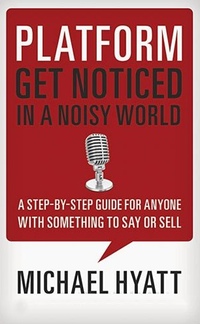Your Brand Is Bigger Than You
- July 7, 2014
- Posted by: Rochelle
- Category: Audience Building, Brand + Design, Personal Brand

Your brand—whether it’s your personal brand or your company’s—may feel like it’s all yours.
But it’s bigger than you.
The members of your community have a stake in it. They feel it viscerally when your brand shifts—or is attacked from the outside.
It can strengthen your reputation. Or pull it down.
Case in point: Michael Hyatt (speaker, author, blogger) vs. the National Speakers Association.
The essential issue: the NSA announced at their annual conference that they are changing their name to “Platform”. The problem? The name is—while perhaps not legally—clearly “owned” in the marketplace by Michael Hyatt.
Adding insult to injury is the new logo uses the same shade of red AND a quite similar graphic to Hyatt’s use on his book cover and various digital properties.
Oops.
Checking google rankings is right in the rebranding 101 playbook—in Chapter 1. So while Michael Hyatt’s supporters debate whether the research was omitted or whether the decision was made to plow forward anyway, the damage is done.
After a week of social media protests (including plenty of comments from members unaware of the Hyatt controversy), the NSA said “We’ve been listening, we hear you and we’re doing something about it.”
Either way, the NSA loses. Either way, Michael Hyatt wins.
Why? Because Michael Hyatt has built an engaged community. His supporters are legion and they are outraged. Hyatt has remained the public gentleman, sharing viewpoints and listening to his supporters. He is doing exactly what he has always done in building his community—staying relentlessly helpful and positive while keeping it real.
In the end, no one is likely to confuse the two brands. And his deft handling of the controversy may well bring him new fans.
But the NSA? Not so much. The best they can do is apologize, belatedly engage some key members in the rebranding effort and re-spend the presumably hundreds of thousands of dollars already invested in the new name.
Rebranding is not an idle exercise. You have to involve the right people without morphing into a committee of bland. You must build trust along the way with transparency and truth, most especially when you’re representing an association of members.
Michael Hyatt got it right with his community. NSA needs to beg for a second chance.
I hope they decide to do the right thing.
Like what you see here? Head on up to that orange bar to sign up pronto and I’ll deliver my weekly insights directly to your in-box.







… doing research of not only your competition, but the business community at large is critical before one begins to define themselves to the world … unless the company is EXACTLY like some other company… and then they’re really in trouble…
Indeed Jeff–the NSA really blew it…
Branding at one time meant identifying your property to prevent it from being stolen. It means the same in today’s world, except it involves more than cattle. If we have something that is working for us; we need to insure and protect our rights of that use. Allowing some other entity to use it is giving up your rights. Not good. Protecting our intellectual as well as personal property is our right. We must legally honor that right at all times.
Couldn’t agree more Ed. The only (sometimes) challenge is protecting everyday words. You can protect your visual brand using those words (a type treatment or logo)–but even then you have to monitor and be prepared to duke it out. It’s why everyone building a brand should invest in both top-flight creative AND legal advice…
Great post Rochelle. I found it interesting that Jason Peterson posted this morning that Interra Health (interrahealth.com) already uses the tagline Inform.Influence. Inspire. They are a different industry altogether so the NSA probably doesn’t care about that.
But, I wonder if they realized that Susan Trivers, the 2009-2010 NSA chapter president in D.C. has a blog titled: Inspire, Inform, Influence (www.greatspeakingcoach.com). If I were her, I wouldn’t be happy about that.
Hi Jennifer! Thanks for the added info. Those 3 words–inform, influence, inspire–are really tough to use together and claim distinction, as your research just proved. Will be interesting to see what they all do next 🙂
I find it just so incredulous that a national organization and its consultants made such a dumb — and costly — mistake. As you know I reserved URLs that related to my practice, including StrategicPublicPolicy.com which also points to my homepage (CoreyBearak.com), strategicpoliticalcounsel.com which points to my “services” page, strategicpublicpolicysolutions.com, which points to my “projects” page and governmentandpublicaffairscounsel.com, which points to my “bio” page. While those who talk ogle ranking and analytics would “oppose” my use of these descriptive pointers I would not want others to be able to use these descriptions that related to my brand. While I continue to weigh using Strategic Public Policy as the name of my firm and my card brandishes the strategicpublicpolicy.com URL rather than CoreyBearak.com, I still lean on me being my brand but find the strategicpublicpolicy.com offers a distinctive description on my card and stationary.
Well stated Rochelle. Perhaps one of the biggest problems that so many organizations have is the blind eye they have towards their own actions and the fallout of those actions. Even if the research had been done (which it should have), it is never a good idea to steamroll through a process so dramatically and almost forcefully. Even the NSA has its customers, and if the people they serve don’t like the product, a forceful rebranding will do more damage than good. It is vital to keep in mind the impact that all of your actions (words and all) will have on your brand. In the end, as your post title states, your brand is much bigger than you. Thanks again for a great article.